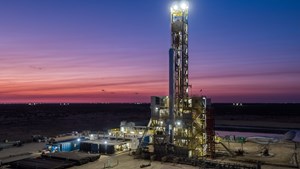Exxon’s historic purchase of shale driller Pioneer to usher in new era of oil mergers in Permian basin
(Bloomberg) --Exxon Mobil Corp.’s $59.5 billion acquisition of Pioneer Natural Resources Co., the biggest U.S. energy deal in decades, is poised to usher in a new era of industry-shifting takeovers.
The shale sector is a hotbed of consolidation talk as oil companies compete for the best drilling portfolios in the Permian basin, North America’s biggest source of crude. Production from that region of West Texas and New Mexico has doubled in just six years to the point where it yields more oil on a daily basis than OPEC heavyweight Iraq.
That robust expansion has exhausted some of the Permian’s highest-quality drilling targets, and companies are turning to acquisitions to shore up future productive capacity. Investors have a lot on the line because a deep bench of untapped reserves are the best guarantee that generous dividends can be maintained in the long term.
“People are definitely going to run out of inventory over the next several years,” Pioneer Chief Executive Officer Scott Sheffield said during a conference call just two months before details of the Exxon deal surfaced. That dynamic “should lead to extreme consolidation.”
North American energy companies completed $75 billion of deals through the first three quarters of the year, roughly flat with a year earlier. But when you combine Exxon’s swoop for Pioneer with all other proposed deals in various stages of advancement, this would be the industry’s biggest deal-making year since the pre-pandemic era, according to data compiled by Bloomberg.
Next up after Pioneer, all eyes are on CrownRock, one of the Permian’s biggest closely held oil and gas producers. The company run by Tim Dunn is up for sale and could fetch around $8 billion, according to a person familiar with the matter. CrownRock didn’t respond to a request for comment.
Here is a list of other shale companies potentially playing some role in the consolidation of the sector:
Chevron. Exxon’s biggest domestic rival, Chevron Corp., already controls Permian drilling rights across an area equal in size to Yellowstone National Park and has plans to push daily production in the region to the equivalent of 1 MMboe by 2025.
CEO Mike Wirth has been a savvy dealmaker, snapping up Noble Energy during the pandemic and Denver-based PDC Energy earlier this year after walking away from Anadarko Petroleum in 2019 to avoid a bidding war with Occidental Petroleum Corp. Chevron’s stock trades at 7.7 times cash flow, higher than all its oil-producing competitors in the S&P 500 Energy Index, giving it strong currency with which to transact.
ConocoPhillips. ConocoPhillips began aggressively expanding in the Permian basin during the Covid-19 pandemic with its $13 billion takeover of Concho Resources, one of the region’s biggest independent explorers. CEO Ryan Lance followed that within months with the $9.5 billion purchase of Shell Plc’s Permian assets. ConocoPhillips’ stock has climbed 60% in the two years since then and its market value is now higher than supermajor bp Plc.
Civitas Resources. Civitas Resources Inc. has been an active dealmaker this year, expanding into the Permian with an acquisition from private equity firm NGP Energy Capital Management for about $4.7 billion in cash and stock. In October, the Denver-based producer reinforced its Permian position when it agreed to buy oil assets in West Texas from Vitol Group for about $2.15 billion.
Coterra Energy. Formed through the 2021 merger of Cabot Oil & Gas and Cimarex Energy, Coterra Energy Inc. has been carefully searching for deals.
“We’re going to be very cautious on M&A,” CEO Thomas Jorden said during a May conference call, adding that the company “would love to find a transaction” that adds value. “But quite frankly, a lot of the assets out there have peaked production.”
Devon Energy. The Oklahoma City company is seen as a possible takeover target because of its diversified footprint across five of the biggest U.S. shale fields, with most of its production coming from the Permian. Devon Energy Corp. bulked up last year with a pair of deals that totaled about $2.7 billion.
Diamondback Energy. Diamondback Energy Inc. purchased Permian explorer Firebird Energy LLC for about $1.6 billion in late 2022. Weeks later, it made a similarly sized deal to buy drilling rights from closely held Lario Oil and Gas Co. On a combined basis, the Firebird and Lario transactions expanded Diamondback’s Permian footprint by an area almost twice the size of Brooklyn.
EOG Resources. One of the largest independent U.S. shale operators, EOG Resources Inc. has shown little interest in big dealmaking. When CEO Ezra Yacob and other EOG executives are quizzed by analysts about the prospect for M&A, they typically say they’re focused on expanding organically and through small, bolt-on acquisitions.
“We built this company on the success of organic exploration, and we see that as the best opportunity for full-cycle returns,” Yacob said at the Barclays CEO Energy-Power Conference on Sept. 5. “We’re not collecting cash on the balance sheet to do some sort of M&A.”
Marathon Oil. With assets across shale fields in New Mexico, North Dakota, Oklahoma and Texas, Marathon Oil Corp. last beefed up its Lone Star State footprint in 2022. The Houston-based producer bought Ensign Natural Resources’ Eagle Ford Shale assets in South Texas for $3 billion in cash.
Permian Resources. The eponymous shale driller’s $2 billion, all-stock agreement to acquire Earthstone Energy Inc. in August was the latest deal for Will Hickey and James Walter, the 30-something co-chief executives who have built Permian Resources Corp. into a major independent shale operator through a series of mergers.
Permian hired Guy Oliphint, managing director and co-head of upstream Americas at investment bank Jefferies as executive vice president and CFO in January.



